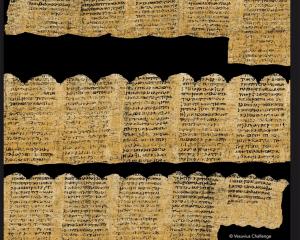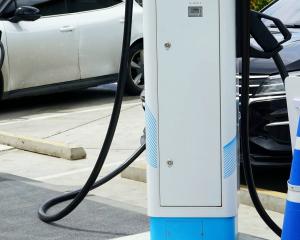Flag referendum? Forget it. Here's six things we would much rather change, writes Bruce Munro.
The two-tier flag referendum is set to be decided on Thursday.
The first round entirely missed the mark as an opportunity for considered reflection on who we want to be as a nation.
So, we are now left choosing between a vestige of colonialism and an underwhelming tea towel.
Alternatively, it is the flag we proudly fought under versus the distinctive banner of our new confidence.
We haven't really talked about it, so we are not sure.
Never mind.
What's $26 million between non-communicative friends?
And anyway, surely there are things we would like to change more than the flag.
Such as our:
PRIMARY INDUSTRY
Dairy prices are going through the basement.
Politicians are estimating that between 5% and 25% of the country's dairy farmers will go bust during the coming 18 months.
So, it is probably time to quickly but calmly (no sudden movements lest we spook investors) cast around for an alternative.
Such as poetry.
Poetry could be our new primary industry and, if we play it right, our biggest export earner.
Award-winning Dunedin poet Sue Wootton is certain it is a winsome plan.
"So many advantages would flow from a primary industry which valued expressive excellence,'' Wootton says.
"As a nation we would become renowned for our creative, flexible thinking, our insights, our humanity, and our knack with ambiguity, paradox and doubt.''
She has clear ideas about how New Zealand could become a country of export-quality poetry producers.
"We stop irrigating paddocks and start irrigating minds. We invest in a culture and an education system which encourages people to be deeply engaged in both science and the humanities.''
A land flowing with not so much milk but plenty of poetry needs an outlet, a market.
This could be a hard sell.
But that is what marketers are for.
Dr Roel Wijland is a lecturer in the marketing department at the University of Otago.
He did his PhD in a combination of poetry and marketing.
Dr Wijland says the demand is already there.
"Lyricism is a necessary part of everything New Zealand wants to sell. Few things are ordinary down here,'' he says.
"The worldwide demand to be touched by a stunning fragile place, its creative minds and the products we make, is endless.''
There are, however, challenges to making it our leading export earner, he adds.
"The all too common ‘good is good enough' embrace of functionality; the killing fields of grey committees . . . ; New Zealand's 20th century, persistent gap between art and business creativity.''
NATIONAL SPORT
It is time for rugby to give up its stranglehold on New Zealand sporting loyalties.
It is time for chess boxing to take its rightful place in the sunlight of our affection.
What could be better than the idea of six rounds of boxing interspersed with five rounds of chess?
Only the fact that it is real.
Chess boxing is growing in popularity in Europe and Asia.
A world championship held in Moscow in 2013 drew an audience of more than 1200 enthusiastic fans.
But it has had limited exposure in New Zealand.
In 2008, Kiwi musician Reb Fountain featured chess boxing in a music video.
Playing the part of a chess boxer in the video was Auckland boxing coach Dylan Russell.
The next year, Russell coached one of two amateurs in the only known chess boxing match to have been held in New Zealand.
It would be difficult to wean people off rugby because not many New Zealanders understand or follow chess, he says.
It would, however, be a great national sport "because both boxing and chess are thinking sports'', he adds.
That might explain its lack of appeal so far.
But let's not be defeatist.
Let's replicate some of that mental strength-in-adversity the All Blacks have developed in recent years and use it to usher in the post-rugby era.
To take part in a chess boxing global-level event, athletes need a chess Elo rating of 1600 and a history of 50 or more amateur boxing or martial arts bouts.
Russell has some suggestions for a chess boxing training regime.
At least six months training, consisting of a run each morning and two hours of boxing each evening, five days a week, he says.
Quentin Johnson, junior development officer at the Otago Chess Club, says chess boxing would get his vote.
To get the required Elo rating, a beginner would need to serve a solid two- or three-year chess apprenticeship, Mr Johnson says.
Play a little every day, come along to chess club each week, learn from your own games, study the theory of chess and the strategies of past chess masters, he says.
Of course, the best way to get to the top is start young.
To that end, a KiwiSport version of chess boxing could be introduced in all schools throughout the country; probably a mix of checkers and pillow fights.
COUNTRY NAME
New Zealand, as a name, has surely passed its use by date.
New?
After 370 years?
And what does this country have in common with a sodden chunk of the Netherlands?
The key question is not whether we should change the name of our country, but by what process?
There is a quite recent precedent.
Using that road-tested template, the Government will scrape together about $26 million and then invite political parties to each nominate candidates for the Name Consideration Panel.
Selection criteria will ensure the gender, age and ethnic-inclusive panel excludes anyone specifically qualified to create a new name.
The 12-member panel will call for the public to mind-map, brainstorm, doodle and generally think their way inside and outside the box to a new country moniker.
Those living in west New Zealand (aka Melbourne) will be particularly encouraged to have a go.
At some point, the prime minister will express his support for anything that is likely to get a high hit rate on a Google search.
When the panel has, in their collective and impartial wisdom, chosen the four best contenders, everyone else will be invited to say which name they least hate.
If, at the last minute, a sizeable group agitate because Ochre Summit was not nominated as the nation's new name, it will be shoe-horned into the mix.
The winner is likely to be mediocrity.
To prove we have democracy in spades, everyone will then be asked to vote again.
This time "New Zealand'' will go up against its potential usurper.
By this elegant process our nation will become Pure Tolkien Paradise Land.
NATIONAL ANTHEM
It is not widely known that New Zealand, sorry, Pure Tolkien Paradise Land, has two official national anthems; God Defend New Zealand and God Save the Queen.
God Defend New Zealand has strong Otago links.
The words were penned in 1876 by journalist and poet Thomas Bracken.
The hymn was printed in the Dunedin-based Saturday Advertiser, of which he was editor.
The newspaper then ran a competition to compose music for it.
The winner was John Joseph Woods, of Lawrence, who knocked out the tune in an evening and was given 10 guineas for his trouble.
The song grew in popularity.
A century later, in 1976, Garth Henry Latta, of Dunedin, successfully petitioned Parliament for God Defend New Zealand to officially become a national anthem.
Which brings us to today. If we have two national anthems, why not three?
The Otago Daily Times has a journalist who is also a poet.
The inimitable John Gibbs has written a possible new national anthem.
English professors are likely to be the only ones who recognise the slight debt it owes to God Defend New Zealand.
Here, published for the first time, is the first stanza of Goddess Defend Our Pavlova:
Goddess of Pavlova, bring a Plate,
Keen as bounding kangaroos, we'll sell our meat.
Protect all butter, milk, all kiwi fruit,
And defend us from obesity trends.
May deities guard our youthful rugby stars
from Transtasman cross-code talent snatchers.
Let our snores or snuffles not be heard afar,
And, Goddess, defend our merino lambs.
It would be fitting if, in 100 years time, a descendant of Mr Latta took it upon themselves to petition Parliament for the inclusion of Goddess Defend Our Pavlova as our third national anthem.
In the meantime, we can all do our part to make it the new unofficial national anthem by singing it loudly and proudly at all chess boxing matches.
Of course, that depends on the words having an accompanying tune.
See competition details below.
TIME ZONE
It is surprising that no-one has thought of this before.
Some countries have executed a one-off shift of the international dateline to give themselves a perceived advantage.
During the 1990s, Kiribati and Tonga diverted the dateline around their eastern borders, letting them tell prospective tourists they would be the first rather than the last to see the dawn of the new millennium.
In 2011, Samoa and the Tokelau island group did the same thing, so as to be on the same day as New Zealand and Australia.
But stepping backwards and forwards through time zones at regular intervals, that is the sort of left-field thinking that would undoubtedly warm the ventricles of Steven Joyce, the Minister for Science and Innovation.
Datelines are not governed by international law.
There is nothing to say we cannot use the dateline like a skipping rope if we choose.
If we want to be the little time-warping country that could, then so we should.
If we want to say "It's Monday'' and then, when we get to midnight, tuck our knees in tight, step to the right (across the dateline) and announce "It's Monday'', no-one can stop us.
The economic benefits would be enormous.
In 2015, three million visitors made tourism our second-largest export earner.
Simply by hitting the "repeat'' button every other day, all those visitors on their 10-day self-drive or package tours would end up having twice as good a time (and spending twice as much on accommodation, food, activities and trinkets) before their departure date arrived.
Almost $10 billion in annual earnings would become $20 billion, literally overnight.
One hundred percent pure genius.
Dr Ivan Diaz-Rainey, who is a senior lecturer in finance at University of Otago, clearly does not appreciate quite how fantastic the plan is.
While conceding that it could mean four-day working weeks and double dividend payments, Dr Diaz-Rainey predicts it would cause financial and commercial chaos.
"More generally, it sounds crazy,'' he says.
NATIONAL LANGUAGE
New Zealand is a nation of early adopters, boldly going where only a well-honed sense of adventure and slightly less polished capacity for critical thinking could take us.
Esperanto could be our great new social experiment.
Polish doctor L. L. Zamenhof created Esperanto in the late 19th century.
The idea was to create a truly international language which would enable worldwide communication, fostering global understanding.
Based on European languages, it has a simple grammar and vocabulary.
Today, about a million people scattered across all seven continents speak Esperanto.
But it is a grand idea whose heyday came and went sometime around the 1920s.
It is a cause that has been languishing on the world stage for decades, awaiting a new champion.
Imagine the impact if all New Zealanders learnt Esperanto.
We are regularly reminded of how mono-linguistic we are.
And that despite having three official languages: English, Maori and New Zealand sign language.
So, here is our chance to take the linguistic bull by the horns, and ride it all the way to world peace.
David Ryan is treasurer of the New Zealand Esperanto Association.
He has been speaking Esperanto for 35 years.
It allows people to retain their mother tongue but still speak to each other as equals through a shared, neutral language, Mr Ryan, a Wellington-based financial and policy analyst, says.
"It widens your world,'' he says.
A magazine may describe Angelina Jolie as the most beautiful actress in the world.
But that is likely to be an English language-centric point of view.
"It ignores the fact that there could be a whole lot of Asian or Latin American or Russian actresses that we don't know about,'' he explains.
Senior linguistics lecturer Dr Anne Feryok, of the University of Otago, says there could be unexpected benefits if the nation was learning Esperanto in the run up to next year's general election.
"It takes years to learn a language, especially to develop educated adult speaker ability,'' Dr Feryok warns.
"And who's going to pay for the lessons? If people think the flag referendum cost a lot, imagine having to pay for seven years of language lessons.''
On the other hand, some people learning a language have a period of time during which they try to absorb the language without speaking, she says.
"This could be great when elections are coming up, if politicians were going through that silent period''.
Do the All Blacks want to be called Ciuj Nigrulog?
Would Kiwis still be Kiwis if they were known as Kivos?
She'll be right.
Let's go for it.
Here are three phrases in Esperanto to get you started.
"Mi preferus paroli en Esperanto.'' I prefer to speak Esperanto.
"Damne, Danielo, vi portas denove la Vans-ŝuojn.'' Damn Daniel, at it again with the white Vans. (Ask your children.)
"Bonege, amiko.'' Sweet as, bro.
Anthem ideas
• To enter the national anthem music competition, send sheet music of original compositions to Goddess Defend Our Pavlova, c/- Otago Daily Times, PO Box 517, Dunedin. Include your name and contact details. Judge's decision is final. Because guineas are no longer legal tender in New Zealand, the prize will be enduring fame or notoriety, whichever comes first.












